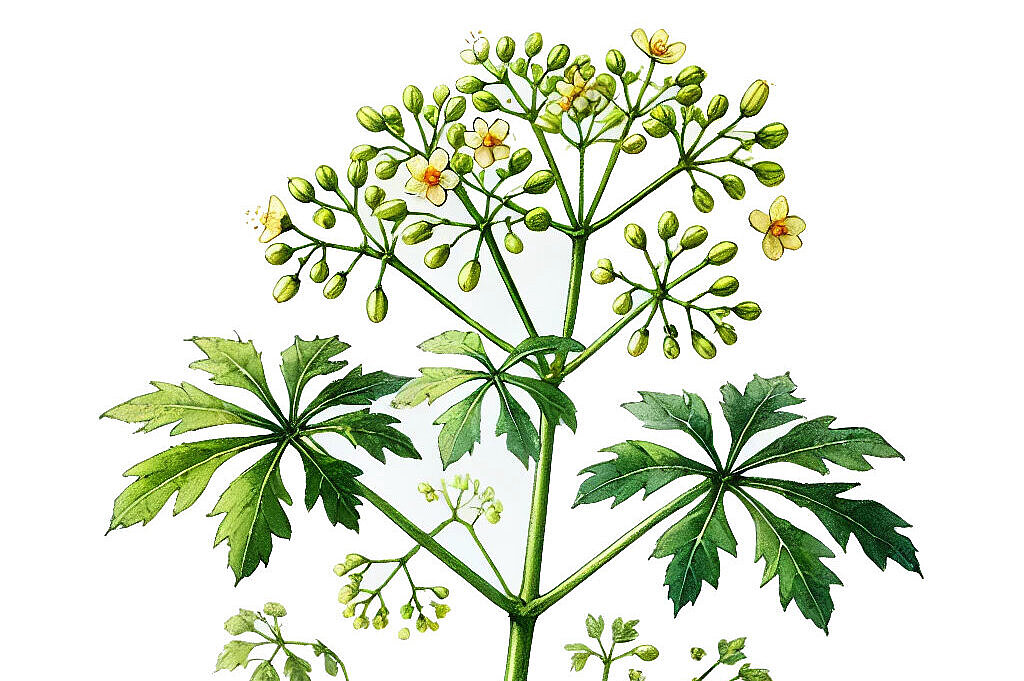Ladanum

What is ladanum?
Ladanum is a dark, sticky resin that was traditionally obtained by combing the wool of goats and sheep that had become entangled in the cistus bushes. Nowadays, it is mainly obtained by extraction with solvents or by collecting the resins directly from the plants themselves. It is known for its rich, amber-like scent and is often used in the manufacture of perfumes and as an ingredient in various cosmetic products.
Potential benefits of ladanum for dogs
Antiseptic properties
Ladanum is traditionally thought to have a number of healing properties, including antiseptic and antimicrobial effects. When used topically, it could theoretically help treat minor skin lesions or infections in dogs.
Calming effect
The aromatherapeutic properties of ladanum could potentially have a calming effect on dogs, similar to lavender or chamomile. This could be particularly beneficial for anxious or stress-prone dogs.
Possible risks and disadvantages
Toxicity
As with many plant extracts and natural resins, there is a potential risk of toxicity with ladanum, particularly if ingested orally. Symptoms of poisoning may include vomiting, diarrhea and, in severe cases, neurological disorders.
Allergic reactions
Some dogs may be sensitive to ladanum and similar substances, which can lead to skin irritation, itching or allergic reactions. Caution should therefore be exercised, especially when using it for the first time.
Lack of scientific research
There is limited scientific research on the effects of ladanum on dogs, making it difficult to draw definitive conclusions about its safety and efficacy. Without sound scientific evidence, dog owners should be cautious if they decide to use ladanum in any form.
Precautions and recommendations
- Start with small amounts: If you decide to use Ladanum topically, start with small amounts and monitor your dog for signs of a negative reaction.
- Avoid oral ingestion: Make sure your dog is not able to lick or eat products containing Ladanum to minimize the risk of poisoning.
To be used with caution
While ladanum has been prized for centuries for its fragrant and putative healing properties in humans, its use in dogs is not without risks. The potential benefits, such as antiseptic and calming effects, must be weighed against the potential risks, including toxicity and allergic reactions. Without extensive scientific research into the specific effects of ladanum on dogs, it is advisable to exercise caution and seek professional advice when using this resin. Ultimately, the safety of your dog is of paramount importance and any decision to use ladanum or similar substances should be carefully considered.
If you notice any signs of hypersensitivity or poisoning in your dog, you should see your vet immediately. We are not a substitute for a vet, but we try to be as accurate as possible. Every dog reacts differently and we recommend you get a second opinion or consult your vet if in doubt.
Stay healthy and take good care of your four-legged friend!😊
Similar to Ladanum
Myrrh is the resin extracted from the cracks of trees of the Commiphora genus, which are mainly found in the dry regions of Africa and the Middle East. Even in ancient times, myrrh was highly...
What is frankincense and how does it work? Frankincense is the dried resin of trees of the Boswellia genus, which grow mainly in Africa and Asia. The resin contains various ingredients that have...
Benzoin is the resin extracted from the trunk of the styrax tree. This resin has a long history in various cultures, where it is valued for both its healing properties and its pleasant fragrance. It...
The stiff-haired gumroot, scientifically known as Doronicum columnae, is a perennial plant that is mainly found in mountainous regions of Europe. It is characterized by its bright yellow flowers and...



